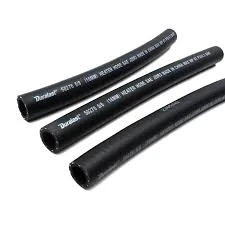High-Quality Gas Fuel Hose - Durable and Flexible Solutions for Your Needs
Sep . 11, 2024 17:38 Back to list
High-Quality Gas Fuel Hose - Durable and Flexible Solutions for Your Needs
Understanding Gas Fuel Hoses Essential Components for Efficient Fuel Transfer
Gas fuel hoses are critical components in the transport and delivery of fuels in various applications, including automotive, industrial, and commercial settings. These hoses ensure the safe and efficient transfer of gasoline, diesel, and other fuels, playing a vital role in maintaining the operational integrity of fuel systems.
One of the primary functions of gas fuel hoses is to transport fuel from one point to another while preventing leaks and maintaining pressure. The design and materials used in manufacturing these hoses are crucial in determining their performance and durability. Typically made from rubber, reinforced rubber, or thermoplastic, gas fuel hoses are engineered to resist not only the corrosive nature of various fuels but also temperature variations and mechanical stresses.
Safety is a paramount consideration when it comes to gas fuel hoses
. The potential risks associated with fuel transfers, such as leaks, spills, or explosions, necessitate stringent standards for hose construction. Many manufacturers meet or exceed industry regulations, such as those set by the American Society for Testing and Materials (ASTM) and the National Fire Protection Association (NFPA). These standards dictate the specifications regarding hose flexibility, tensile strength, and resistance to certain chemicals, ensuring that the hoses can endure demanding conditions.gas fuel hose

In addition to safety, the installation and maintenance of gas fuel hoses are crucial for optimal performance. Proper installation ensures that the hoses are routed correctly and secured at all connection points, which minimizes the risk of kinks, bends, or abrasions that could lead to failures. Regular inspections can identify wear and tear, and timely replacement of damaged or aged hoses prevents unforeseen malfunctions. It is essential for users to follow guidelines provided by the manufacturer regarding the lifespan and maintenance procedures for their specific gas fuel hoses.
Moreover, advancements in technology have led to the development of more robust and efficient gas fuel hoses. Innovations such as anti-static materials, improved seal designs, and enhanced flexibility have drastically improved hose performance. Such advancements not only extend the lifespan of the hoses but also contribute to the overall safety of fuel handling operations.
In conclusion, gas fuel hoses are indispensable in the realm of fuel transportation and delivery. Their construction, safety features, and maintained performance are central to preventing hazards associated with fuel transfer. As industries continue to evolve and regulations become stricter, the importance of high-quality, reliable gas fuel hoses will only increase. Ensuring proper selection, installation, and maintenance can greatly enhance both safety and efficiency in fuel handling operations, thereby safeguarding lives and the environment.
